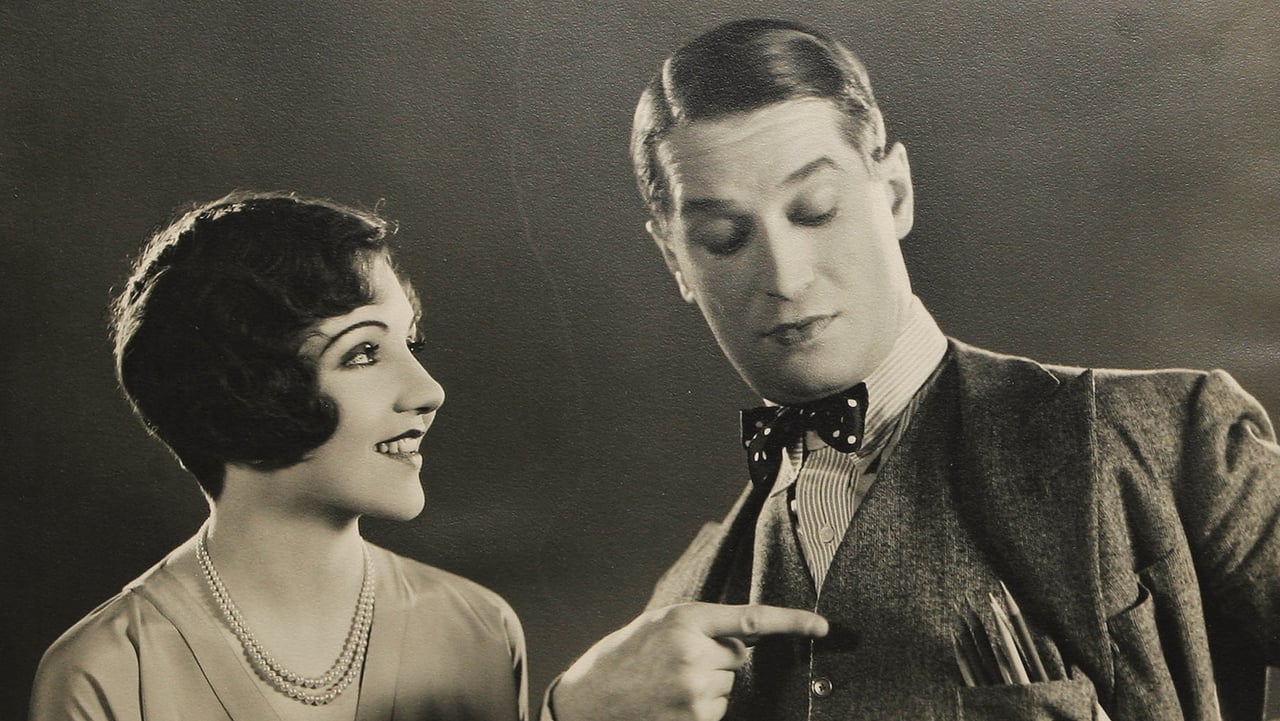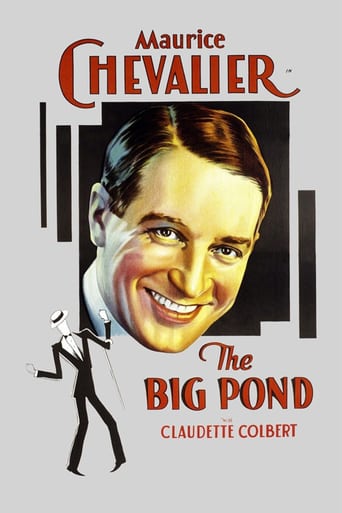calvinnme
I apparently liked this one more than most people, and I thought it was a thoroughly charming romantic comedy. I see that Preston Sturges was a writer on this one and his touch shows. Chevalier plays Pierre, a guide of rather noble background whose family lost their money in the first World War. Barbara (Claudette Colbert), the rather spoiled daughter of the wealthy Billings family, falls for Pierre during the family's European vacation. When her father first finds out that Barbara wants to marry this man, he explodes. But then he reconsiders. He figures his best option is to take Barbara's side, take Pierre back to America with them, put him to work in the family business - they make chewing gum , and show Barbara that he could never fit in.So this boils down to your basic fish out of water story, but Pierre is a very sincere and charming Gallic guppy. In America he wins over everyone from his rooming house landlady who also happens to be French to his gruff coworker (Nat Pendleton) who was instructed to "give Pierre the business" by Mr. Billings but lightens up after he just can't help liking the guy.However, Pierre's blessings - his quick wit and likability - are also a curse. His reluctant father-in-law to be soon finds Pierre quite the idea man and pretty soon Pierre has worked himself up from hard physical labor to a nice job and a nice office to match. This has him spending much time at work, neglecting Barbara, and even turning his love song to Barbara into a chewing gum jingle much to Barbara's dislike. Will things work out for Pierre and Barbara? Watch and find out.Chevalier is pretty much the whole show in this one since it really is Pierre's story - Claudette Colbert is not given that much to do. Maybe that's a good thing since she is playing a very spoiled girl that must think the money with which she parties is heaven sent since she is so opposed to the men in her life working long hours and upsetting her social calendar. But this is a comedy, so her excesses and shortcomings are not explored here. The song "You Brought a New Kind of Love to Me" gets reprised to the point of excess, but still it manages to not wear out its welcome.
lugonian
THE BIG POND (Paramount, 1930), directed by Hobart Henley, is a familiar story that has the makings of a very fine "rich girl loving common man" plot had it been made a few years into the decade when the cycle of screwball comedies was at its peak. Starring the energetic Frenchman Maurice Chevalier, THE BIG POND pairs him for the first time opposite another French native gone Hollywood, Claudette Colbert. Colbert's role as the daughter of a self-made millionaire appears to have been a dress rehearsal for her, for that she was to play a similar role in IT HAPPENED ONE NIGHT (Columbia, 1934), and winning an Academy Award for her performance. While this is far from being worthy of an Academy Award for Colbert, it is Chevalier who was nominated, along with his earlier work in THE LOVE PARADE (1929). Although worthy for the nomination for THE LOVE PARADE, THE BIG POND offers nothing new nor challenging for Chevalier's acting talent except for his popularity at the time. Based on the stage play by George Middleton and A.E. Thomas, the title of THE BIG POND is categorized as a ocean between the home of the central character (Venice) and the place he hopes to make his home with his new found bride (America)."Springtime in Venice" is the opening title as the scenario fades into the locale in Italy where the vacationing Barbara Billings (Claudette Colbert), the American daughter of an impoverished family whose father owns Billings Pepsin Chewing Gum, has met and fallen in love with her guide, Pierre Mirande (Maurice Chevalier). Although Pierre meets with the approval of her mother, Emily (Marion Ballou), this relationship doesn't rest well with both her father, Henry (George Barbier), who takes him for a fortune hunter after her money, and her fiancé, Ronnie (Frank Lyons), who happens to be her father's associate. In order to please Barbara and discourage Pierre, Henry decides to offer Pierre a position at his chewing gum factory upon their return home in the states, and won't approve of their marriage until he proves himself successful. While there, Pierre is given the business, with Ronnie, now the rejected suitor, finding him a place to live in a shabby boarding house, which is run by a French landlady, while Henry makes sure things do not come easy for Pierre during his employment at the plant. Pierre, whose ambition is to earn $20,000 a year, works so hard that by the end of the day be becomes overly exhausted, causing him to miss attending Barbara's social function as he spends the entire night sleeping in bed while dressed up in his evening clothes. While Henry feels his plan is working, especially since that Barbara being stood up has caused her to change her mind about marrying Pierre, he soon finds that the joke will be on him.The small list of supporting players consists of Nat Pendleton as Pat O'Day; Andree Corday as Toinette; and Elaine Koch as Jennie. Koch, a child of about 10, whose performance comes as a cross between other child actresses, Mitzi Green and Sybil Jason, makes her movie debut as well as her final screen appearance. She plays an orphan who works at the boarding house who, like many others, becomes very fond of Pierre. She has one heartwarming scene where she sings the overly tired Pierre to sleep. Whatever became of her?The musical soundtrack for THE BIG POND includes: "You Brought a New Kind of Love to Me," (by Irving Kahal and Sammy Fain/French lyrics by Pierre Norman); "You Brought a New Kind of Love to Me" (reprised by Chevalier, harmonized by Colbert); "Living in the Sunlight, Loving in the Moonlight" (by Al Lewis and Al Sherman; "You Brought a New Kind of 'Gum' to Me" and "This Is My Lucky Day" by Lew Brown, B.G. DeSylva and Ray Henderson. If the song "You Brought a New Kind of Love to Me" sounds familiar, its introduction by Chevalier is overshadowed by the Four Marx Brothers, who immortalized it in one of their best comedies, MONKEY BUSINESS (1931) which features a highlight scene where they are each seen imitating Chevalier by separately reciting and/or singing the opening lyrics, "If the nightingales could sing like you ..." The song became popular for Chevalier, in spite of his four reprises and over exposure in its underscoring, that after a while, grows tiresome.While the premise for THE BIG POND is good, it suffers today, as with most early talkies, due to slow pacing and lack of musical underscoring under the dialog or in between scenes. With future comedy director Preston Sturges credited as one of the scriptwriters, one would expect some funny one-liners or witty dialog, but it the final print, it has little to offer except Chevalier, who manages to liven things up a bit, especially when singing to the associates during a business meeting of "Loving in the Moonlight" while holding or wearing his trademark straw hat.Rarely shown on television, availability to THE BIG POND on video cassette has been located through a private collector. Audio is fine but picture quality is poor mainly to its occasional fade in and fade out darkness. Though not as better known as some of his earlier works, THE BIG POND is among Chevalier's other list of forgotten film titles during his Paramount years (1929-1933), including INNOCENTS OF Paris (1929), PLAYBOY OF Paris (1930), A BEDTIME STORY and THE WAY TO LOVE (both 1933). THE SMILING LIEUTENANT (1931), which reunited him with Colbert for the second and last time, has become a rediscovered gem and an improvement over THE BIG POND, thanks to director Ernst Lubitsch. While THE BIG POND may not be the best film for both of them, there's no harm done in watching Chevalier and Colbert early in their careers. (**)

